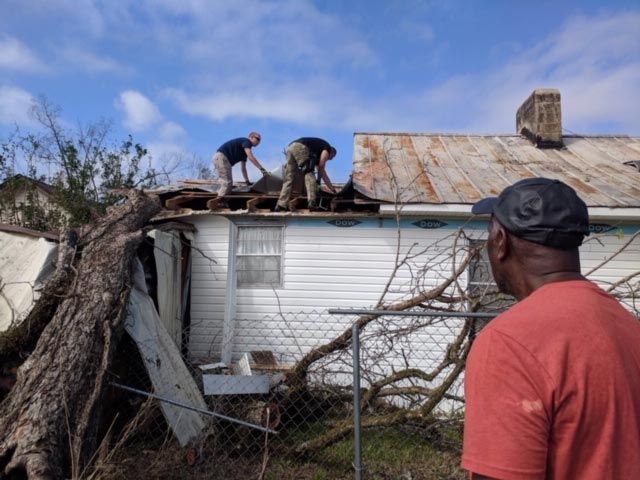Contact Us
To provide feedback on the Community Policing Dispatch, e-mail the editorial board at CPDispatch@usdoj.gov.
To obtain details on COPS Office programs, publications, and resources, contact the COPS Office Response Center at 800-421-6770 or AskCopsRC@usdoj.gov

U.S. Department of Justice
Office of Community Oriented Policing Services
Washington, DC 20530
 On October 10, 2018, Hurricane Michael made landfall near Mexico Beach, Florida. It was the first category 5 hurricane to make landfall on the U.S. mainland in more than 25 years. (Other storms that reached category 5, such as Hurricane Katrina in 2005, had weakened before they struck the U.S. mainland.) The National Oceanographic and Atmospheric Association (NOAA) estimated that at least 45 fatalities resulted from the storm on the mainland alone.
On October 10, 2018, Hurricane Michael made landfall near Mexico Beach, Florida. It was the first category 5 hurricane to make landfall on the U.S. mainland in more than 25 years. (Other storms that reached category 5, such as Hurricane Katrina in 2005, had weakened before they struck the U.S. mainland.) The National Oceanographic and Atmospheric Association (NOAA) estimated that at least 45 fatalities resulted from the storm on the mainland alone.
In Largo, Florida, emergency services were as prepared as they could be for a category 5. Largo is situated between Clearwater and St. Petersburg, sitting just inside the barrier islands of the Gulf of Mexico. “During the storm,” said Officer Andrew Lynch, “they have us under cover. You can’t help people if you’re in trouble. Once the winds drop below 75 miles an hour or so, we’re allowed back out.” So many trees had been felled that it took nearly a week to clear the roadways. In the meantime, local departments had their hands full dealing with the looting and other petty crime that tends to follow a storm.
“We were the second group in,” he said, referring to himself and his partner, Sergeant Nicholas Cusumano. “We were on the day shift and we thought, okay, people aren’t acting up and getting too crazy law enforcement–wise, so let’s do something.” They thought of Melvin, whose roof is featured in the photo. Lynch and Cusumano knew Melvin from regular beat work in the neighborhood, and they knew that Melvin didn’t have the money needed to start repairs.
 “Some parts of the city had enough money to start work immediately—” Officer Lynch paused—“but the lower-income part of town was in trouble.” Melvin’s old tin roof had given in under the rainfall and the wind, and water was falling freely into the residence. Lynch and Cusumano went to a charitable distribution warehouse (he cannot remember the organization but does remember that it was a faith-based nongovernmental organization) and procured a tarp to try and keep the water out until work could start. Then they helped Melvin arrange the tarp to cover the worst of the damage.
“Some parts of the city had enough money to start work immediately—” Officer Lynch paused—“but the lower-income part of town was in trouble.” Melvin’s old tin roof had given in under the rainfall and the wind, and water was falling freely into the residence. Lynch and Cusumano went to a charitable distribution warehouse (he cannot remember the organization but does remember that it was a faith-based nongovernmental organization) and procured a tarp to try and keep the water out until work could start. Then they helped Melvin arrange the tarp to cover the worst of the damage.
“It takes months for the insurance, though,” Officer Lynch reported. “Every time it takes months and months for the money to come in and for work to start. We were lucky that we didn’t have a lot of criminal activity to deal with, but it felt good to do something to help.” Not only did the officers help Melvin with his roof but they also made runs to the warehouses and food donation centers and brought necessities to the community. “It’s the first time I’ve done it. I enjoyed being able to do something different to help. I look forward to doing it more.”
Sarah Estill
Social Science Analyst
Subscribe to Email Updates
To sign up for monthly updates or to access your subscriber preferences, please enter your email address in the Subscribe box.






